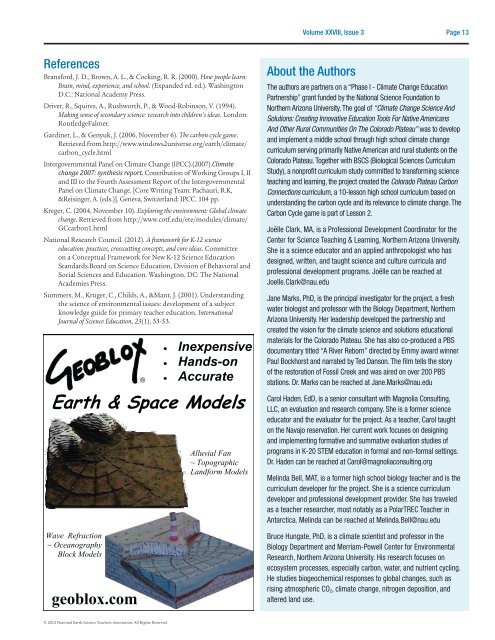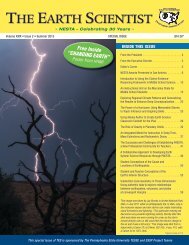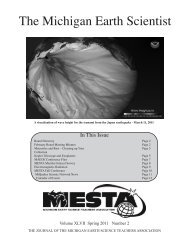The Earth Scientist
Fall 12.pdf - NESTA
Fall 12.pdf - NESTA
- No tags were found...
Create successful ePaper yourself
Turn your PDF publications into a flip-book with our unique Google optimized e-Paper software.
Volume XXVIII, Issue 3<br />
Page 13<br />
References<br />
Bransford, J. D., Brown, A. L., & Cocking, R. R. (2000). How people learn:<br />
Brain, mind, experience, and school. (Expanded ed. ed.). Washington<br />
D.C.: National Academy Press.<br />
Driver, R., Squires, A., Rushworth, P., & Wood-Robinson, V. (1994).<br />
Making sense of secondary science: research into children’s ideas. London:<br />
RoutledgeFalmer.<br />
Gardiner, L., & Genyuk, J. (2006, November 6). <strong>The</strong> carbon cycle game.<br />
Retrieved from http://www.windows2universe.org/earth/climate/<br />
carbon_cycle.html<br />
Intergovernmental Panel on Climate Change (IPCC).(2007).Climate<br />
change 2007: synthesis report. Contribution of Working Groups I, II<br />
and III to the Fourth Assessment Report of the Intergovernmental<br />
Panel on Climate Change. [Core Writing Team: Pachauri, R.K,<br />
&Reisinger, A. (eds.)]. Geneva, Switzerland: IPCC. 104 pp.<br />
Kreger, C. (2004, November 10). Exploring the environment: Global climate<br />
change. Retrieved from http://www.cotf.edu/ete/modules/climate/<br />
GCcarbon1.html<br />
National Research Council. (2012). A framework for K-12 science<br />
education: practices, crosscutting concepts, and core ideas. Committee<br />
on a Conceptual Framework for New K-12 Science Education<br />
Standards.Board on Science Education, Division of Behavioral and<br />
Social Sciences and Education. Washington, DC: <strong>The</strong> National<br />
Academies Press.<br />
Summers, M., Kruger, C., Childs, A., &Mant, J. (2001). Understanding<br />
the science of environmental issues: development of a subject<br />
knowledge guide for primary teacher education. International<br />
Journal of Science Education, 23(1), 33-53.<br />
geoblox.com<br />
®<br />
<br />
Inexpensive<br />
Hands-on<br />
Accurate<br />
<strong>Earth</strong> & Space Models<br />
Wave Refraction<br />
~ Oceanography<br />
Block Models<br />
<br />
<br />
Alluvial Fan<br />
~ Topographic<br />
Landform Models<br />
About the Authors<br />
<strong>The</strong> authors are partners on a “Phase I - Climate Change Education<br />
Partnership” grant funded by the National Science Foundation to<br />
Northern Arizona University. <strong>The</strong> goal of “Climate Change Science And<br />
Solutions: Creating Innovative Education Tools For Native Americans<br />
And Other Rural Communities On <strong>The</strong> Colorado Plateau” was to develop<br />
and implement a middle school through high school climate change<br />
curriculum serving primarily Native American and rural students on the<br />
Colorado Plateau. Together with BSCS (Biological Sciences Curriculum<br />
Study), a nonprofit curriculum study committed to transforming science<br />
teaching and learning, the project created the Colorado Plateau Carbon<br />
Connections curriculum, a 10-lesson high school curriculum based on<br />
understanding the carbon cycle and its relevance to climate change. <strong>The</strong><br />
Carbon Cycle game is part of Lesson 2.<br />
Joëlle Clark, MA, is a Professional Development Coordinator for the<br />
Center for Science Teaching & Learning, Northern Arizona University.<br />
She is a science educator and an applied anthropologist who has<br />
designed, written, and taught science and culture curricula and<br />
professional development programs. Joëlle can be reached at<br />
Joelle.Clark@nau.edu<br />
Jane Marks, PhD, is the principal investigator for the project, a fresh<br />
water biologist and professor with the Biology Department, Northern<br />
Arizona University. Her leadership developed the partnership and<br />
created the vision for the climate science and solutions educational<br />
materials for the Colorado Plateau. She has also co-produced a PBS<br />
documentary titled “A River Reborn” directed by Emmy award winner<br />
Paul Bockhorst and narrated by Ted Danson. <strong>The</strong> film tells the story<br />
of the restoration of Fossil Creek and was aired on over 200 PBS<br />
stations. Dr. Marks can be reached at Jane.Marks@nau.edu<br />
Carol Haden, EdD, is a senior consultant with Magnolia Consulting,<br />
LLC, an evaluation and research company. She is a former science<br />
educator and the evaluator for the project. As a teacher, Carol taught<br />
on the Navajo reservation. Her current work focuses on designing<br />
and implementing formative and summative evaluation studies of<br />
programs in K-20 STEM education in formal and non-formal settings.<br />
Dr. Haden can be reached at Carol@magnoliaconsulting.org<br />
Melinda Bell, MAT, is a former high school biology teacher and is the<br />
curriculum developer for the project. She is a science curriculum<br />
developer and professional development provider. She has traveled<br />
as a teacher researcher, most notably as a PolarTREC Teacher in<br />
Antarctica. Melinda can be reached at Melinda.Bell@nau.edu<br />
Bruce Hungate, PhD, is a climate scientist and professor in the<br />
Biology Department and Merriam-Powell Center for Environmental<br />
Research, Northern Arizona University. His research focuses on<br />
ecosystem processes, especially carbon, water, and nutrient cycling.<br />
He studies biogeochemical responses to global changes, such as<br />
rising atmospheric CO 2 , climate change, nitrogen deposition, and<br />
altered land use.<br />
© 2012 National <strong>Earth</strong> Science Teachers Association. All Rights Reserved.






